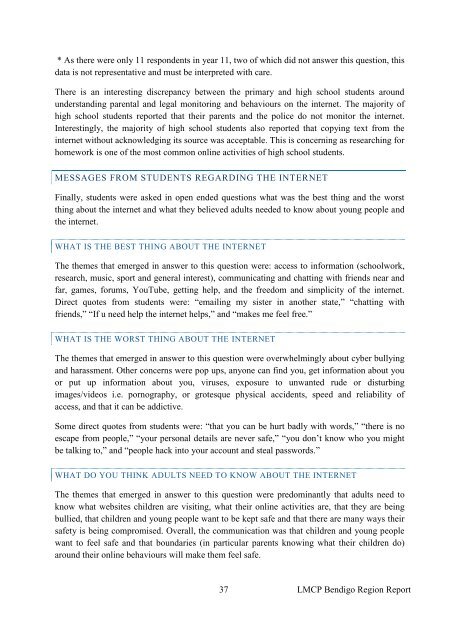LODDON MALLEE - Cyber Safe Kids
LODDON MALLEE - Cyber Safe Kids
LODDON MALLEE - Cyber Safe Kids
You also want an ePaper? Increase the reach of your titles
YUMPU automatically turns print PDFs into web optimized ePapers that Google loves.
* As there were only 11 respondents in year 11, two of which did not answer this question, this<br />
data is not representative and must be interpreted with care.<br />
There is an interesting discrepancy between the primary and high school students around<br />
understanding parental and legal monitoring and behaviours on the internet. The majority of<br />
high school students reported that their parents and the police do not monitor the internet.<br />
Interestingly, the majority of high school students also reported that copying text from the<br />
internet without acknowledging its source was acceptable. This is concerning as researching for<br />
homework is one of the most common online activities of high school students.<br />
MESSAGES FROM STUDENTS REGARDING THE INTERNET<br />
Finally, students were asked in open ended questions what was the best thing and the worst<br />
thing about the internet and what they believed adults needed to know about young people and<br />
the internet.<br />
WHAT IS THE BEST THING ABOUT THE INTERNET<br />
The themes that emerged in answer to this question were: access to information (schoolwork,<br />
research, music, sport and general interest), communicating and chatting with friends near and<br />
far, games, forums, YouTube, getting help, and the freedom and simplicity of the internet.<br />
Direct quotes from students were: “emailing my sister in another state,” “chatting with<br />
friends,” “If u need help the internet helps,” and “makes me feel free.”<br />
WHAT IS THE WORST THING ABOUT THE INTERNET<br />
The themes that emerged in answer to this question were overwhelmingly about cyber bullying<br />
and harassment. Other concerns were pop ups, anyone can find you, get information about you<br />
or put up information about you, viruses, exposure to unwanted rude or disturbing<br />
images/videos i.e. pornography, or grotesque physical accidents, speed and reliability of<br />
access, and that it can be addictive.<br />
Some direct quotes from students were: “that you can be hurt badly with words,” “there is no<br />
escape from people,” “your personal details are never safe,” “you don‟t know who you might<br />
be talking to,” and “people hack into your account and steal passwords.”<br />
WHAT DO YOU THINK ADULTS NEED TO KNOW ABOUT THE INTERNET<br />
The themes that emerged in answer to this question were predominantly that adults need to<br />
know what websites children are visiting, what their online activities are, that they are being<br />
bullied, that children and young people want to be kept safe and that there are many ways their<br />
safety is being compromised. Overall, the communication was that children and young people<br />
want to feel safe and that boundaries (in particular parents knowing what their children do)<br />
around their online behaviours will make them feel safe.<br />
37 LMCP Bendigo Region Report


